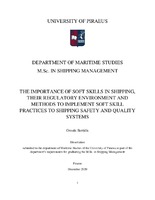The importance of soft skills in shipping, their regulatory environment and methods to implement soft skill practices to shipping safety and quality systems
Η σημασία των ειδικών δεξιοτήτων (soft skills) στη ναυτιλία και μέθοδοι για την πρακτική εφαρμογή αυτών, στον τομέα της ασφάλειας και στα συστήματα ποιότητας

Master Thesis
Συγγραφέας
Μπερτίδης, Ορέστης
Bertidis, Orestis
Ημερομηνία
2020-12Επιβλέπων
Παντουβάκης, ΆγγελοςPantouvakis, Angelos
Προβολή/
Λέξεις κλειδιά
Soft skills ; Human element ; Shipping operations ; Safety and quality systemsΠερίληψη
Αυτή η διπλωματική εργασία ερευνά την σημαντικότητα των soft skills (των επικοινωνιακών
και διαπροσωπικών δεξιοτήτων) στο εργασιακό περιβάλλον της ναυτιλίας, το οποίο σε καμία
περίπτωση δεν περιορίζεται στα γραφεία των διαχειριστριών εταιρειών αλλά κυρίως
επεκτείνεται και περιλαμβάνει το πλοίο και τους ανθρώπους του. Με τα soft skills να αποτελούν
το μείζον θέμα και πεδίο ερευνητικής ενασχόλησης της εργασίας, αναγνωρίζω ότι μια εκτενής
συζήτηση γύρω από τον ανθρώπινο παράγοντα (human factor/element) πρέπει να προηγηθεί της
αναφοράς στα soft skills.
Για το λόγο αυτό, έχω επιλέξει να θεμελιώσω την εργασία μου και να ορίσω τη σημαντικότητα
των soft skills στο χώρο της ναυτιλίας αφού πρώτα έχω αναγνωρίσει την κεφαλαιώδη σημασία
του ανθρώπου – των ναυτικών και του προσωπικού στη ξηρά – για την ασφαλή περάτωση των
λειτουργικών δραστηριοτήτων τόσο εν πλω όσο και στη ξηρά.
Με την έννοια «ασφάλεια» υιοθετούμε την αγγλική ερμηνεία του όρου η οποία είναι διττή
περιλαμβάνοντας τόσο στοιχεία του safety όσο και του quality. Ομολογουμένως όμως η εργασία
αυτή κυρίως επικεντρώνεται στην αλληλεπίδραση των soft skills και της κουλτούρας
ασφάλειας (safety culture) των ναυτιλιακών εταιρειών. Μνεία ωστόσο γίνεται και στο καθεστώς
ασφάλειας ως security.
Αρχικά οριοθετείται η συζήτηση για τα soft skills, με αναφορά στους τέσσερις πυλώνες της
ναυτιλιακής νομοθεσίας, ήτοι τις συμβάσεις SOLAS, MARPOL, STCW και MLC. Στη συνέχεια
γίνεται αναφορά σε πρακτικές όπου εντοπίζεται η ανάγκη ανθρώπινης αλληλεπίδρασης,
εφαρμογής διαπροσωπικών δεξιοτήτων και απαιτείται η ανάπτυξη δομών εκπαίδευσης των
ανθρώπων σε θέματα που ξεπερνούν την αυστηρή τεχνοκρατική κατάρτιση και άπτονται των
ανθρώπινων σχέσεων και διαπροσωπικών αλληλεπιδράσεων. Με βάση τα παραπάνω, η εργασία
αναζητά τη σημασία και την εφαρμογή των soft skillsστο πρόγραμμα Tanker Management SelfAssessment (TMSA) του OCIMF,αναγνωρίζοντας τα βήματα που έχει πραγματοποιήσει ο
οργανισμός στην εισαγωγή των soft skills στο καθημερινό λεξιλόγιο της ναυτιλίας και στις
δομές ασφαλούς διαχείρισης.
16
Σε συνέχεια των παραπάνω γίνεται προσπάθεια να αναζητηθεί η σημαντικότητα
των soft skills σε άλλες βιομηχανίες αναφερόμενοι σε πρακτικές άλλων κλάδων και αναλύοντας
το βαθμό υιοθέτησης και διασποράς των soft skills στην λειτουργία τους. Τέλος, έχοντας
αναφέρει τα παραπάνω, αναφέρονται τα soft skills που βρίσκουν άμεση εφαρμογή στο χώρο της
ναυτιλίας επιχειρώντας να προτείνουμε μια μεθοδολογία για την εισαγωγή πρακτικών που
βασίζονται σε αυτά στις δομές διαχείρισης και στα πρωτόκολλα ασφαλούς διαχείρισης των
διαχειριστριών ναυτιλιακών εταιριών.
Τα soft skills – οι δεξιότητες των ανθρώπων που επιτρέπουν την επιτυχή αλληλεπίδραση με τον
κοινωνικό τους ιστό και τη μετάδοση μηνυμάτων, εντολών και συναισθημάτων – έχουν
εισχωρήσει στο σύγχρονο λεξιλόγιο του εργασιακού περιβάλλοντος. Οι απολήξεις τους
ξεφεύγουν από τον εργασιακό χώρο με τη συζήτηση για τη σημασία των soft skills και την
εκπαίδευση πάνω σε αυτά να βρίσκει γόνιμο έδαφος σε διαφορετικές εκφάνσεις της ζωής μας
όπου η αλληλεπίδραση μας με άλλα άτομα είναι αναγκαία.


